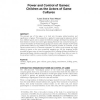1524 search results - page 11 / 305 » Game Relations and Metrics |
EUSFLAT
2007
13 years 11 months ago
2007
We generalize the solution of a multicriterial optimization problem which has been given in [5]. They have used a comparison of the criterion fuzzy preference relations and the ge...
SIGECOM
2006
ACM
14 years 3 months ago
2006
ACM
Finding an equilibrium of an extensive form game of imperfect information is a fundamental problem in computational game theory, but current techniques do not scale to large games...
DIGRA
2003
Springer
14 years 3 months ago
2003
Springer
The primary aim of this paper is to look into the game related practices and significances of games. This perspective is applied to examining the pleasures derived from different ...
DIGRA
2005
Springer
14 years 3 months ago
2005
Springer
This paper introduces the concept of Social Adaptability, a characteristic of games that are explicitly designed to function in changing social environments, and provides initial ...
ECBS
2007
IEEE
14 years 4 months ago
2007
IEEE
Empirical performance evaluation is the process of measuring and calculating performance metrics of deployed software systems. It is a part of performance validation during testin...


